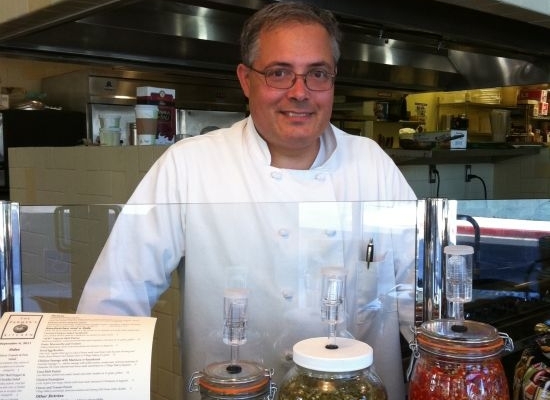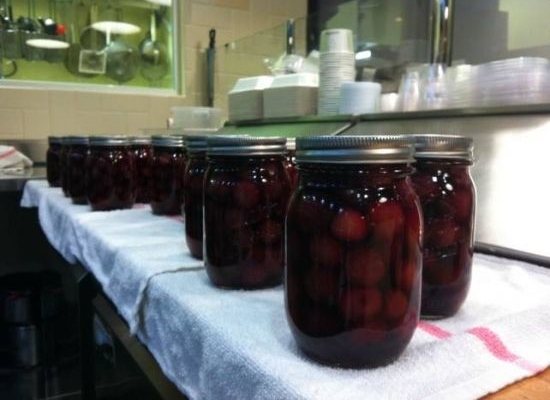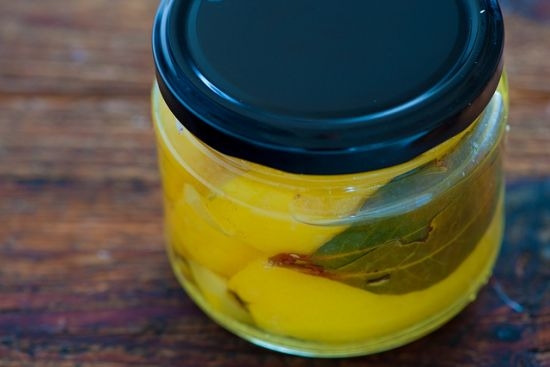Posts Tagged: food preservation
OrganicAuthority.com Interview with MFPLA Lead Instructor Ernest Miller
REPRINTED WITH PERMISSION OF ORGANIC AUTHORITY (www.organicauthority.com)
Earth Day Profile: Chef Ernest Miller on a Different Kind of Soul Food
Written by Lacy Boggs Renner
(image: The Farmer's Kitchen)
In the heart of the bustling Hollywood Farmers Market sits The Farmer's Kitchen: a farm-to-table cafe as well as a commercial teaching, processing and retail kitchen offering affordable, healthy foods for patrons at all income levels. We chatted with chef Ernest Miller about the concept of The Farmer's Kitchen, the importance of eating "food in context" and the selfish reasons why Americans should be getting to know their farmers.
Organic Authority: What is the mission of the Farmer's Kitchen?
Ernest Miller: The Farmer's Kitchen is a non-profit community-oriented kitchen. We are a project of Sustainable Economic Enterprises of Los Angeles (SEE-LA), the non-profit that runs eight farmers markets in the Los Angeles area, including the largest, the Sunday Hollywood Farmers Market, which celebrates its 21st anniversary this year.
The Farmer's Kitchen supports the mission of SEE-LA in many ways: we serve a farm fresh, from scratch lunch to 280 elementary students at a local charter school (Larchmont Charter School West Hollywood) that is part of Alice Waters' Edible Schoolyard Project; we operate as a farm-to-table cafe, serving breakfast and lunch; we provide job and career training to culinary students, high school students and members of the general public who want to learn what it is like to work in a professional restaurant; we provide classes to low resource families (diet, nutrition, cooking, exercise) and classes for the general public; we also make many preserved foods and value-added products with farmers market produce.
(image: The Farmer's Kitchen)
OA: How are you actively involved in the local community?
EM: We are major supporters of the Master Food Preservers of the University of California Cooperative Extension, Los Angeles County, hosting some of their classes in the kitchen. We've also supported the Orange County Master Food Preserver program. We provide technical assistance to the Hollywood Orchard Project, helping them preserve the fruit from their neighborhood.
OA: What drives your menu creation?
EM: The fresh, seasonal produce of the Hollywood Farmers Market, as well as the many different preserved foods we also create.
OA: How do you work with local farmers?
EM: We work very closely with our local farmers, speaking to them on a weekly basis to learn what will be coming in soon, or leaving soon. We make suggestions on what they might want to grow and encourage and consult with them on making value-added products.
OA: Why is it important to you to support local sustainable farmers?
EM: If it isn't sustainable then, by definition, it cannot continue indefinitely. Our industrialized food system has been a boon in many ways, but is not ultimately sustainable. We believe that sustainability is going to have to start with local farmers and teaching people how to eat with the seasons. Local food also tastes better, when it is grown and harvested for flavor, not for shipping well. We believe in "food in context" — that when food is seasonal and expresses the history and culture of a place, it tastes best.
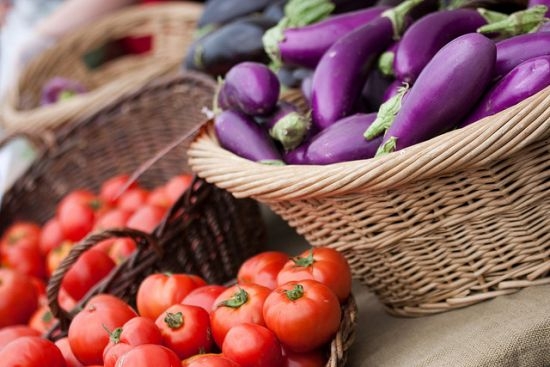
OA: What does sustainability mean to you?
EM: Sustainability means a practice of agriculture, cooking and eating that can go on indefinitely without destroying the health of our environment or ourselves. It is not just the farmers that need to be sustainable, but those who cook and eat the food as well.
OA: Why is it important for Americans to get to know where their food comes from, how it was raised and their farmers?
EM: Self-interest. Food tastes better when it is harvested locally and in season. It is generally less expensive, and is certainly less expensive when you take into account fair labor practices, environmental harms and all the other hidden costs of our industrialized food system.
Ultimately, we need to pay more attention to how and what we eat. We need to eat in context, knowing the place, history and culture of what we eat. When we eat, we feed not only our body, but mind and soul as well. If you don't know where your food comes from, how it was raised and who raised it, you may be feeding your body, but you are starving your mind and soul.
OA: How can America help revive the regional local farmer infrastructure that disappeared over 50 years ago?
EM: Support your local farmers, visit their farms, encourage and support programs that introduce children to what farming is all about (farm-to-school, 4-H).
OA: What cooking tips do you have to inspire home chef to cook more seasonally?
EM: Don't use recipes. Learn techniques, shop the farmers markets for fresh, delicious produce, and cook it simply.
OA: What is your must have, go-to home cooking tool?
EM: A 10-inch Chef's knife.
OA: What are your favorite must-have home pantry staples?
EM: A good extra virgin olive oil, a good pomace olive oil, home pressure-canned beans, brown rice and just to give a special, unique twist to all sorts of dishes, preserved lemons.
(image: jules:stonesoup)
OA: What shopping tips do you have for the home chef?
EM: Shop at a farmers market and see, feel, smell and taste the produce. Talk to the farmers, and don't be afraid to try something you've never had before.
Organic Authority would like to thank Ernest Miller and all of the sustainable, organic farmers and chefs whose work is providing healthy food for us all to eat. We honor you as being conscious stewards of our planet. And, we are thrilled to have you participating in our Earth Day event!
Home Preserved Foods: Nutrition friend or foe
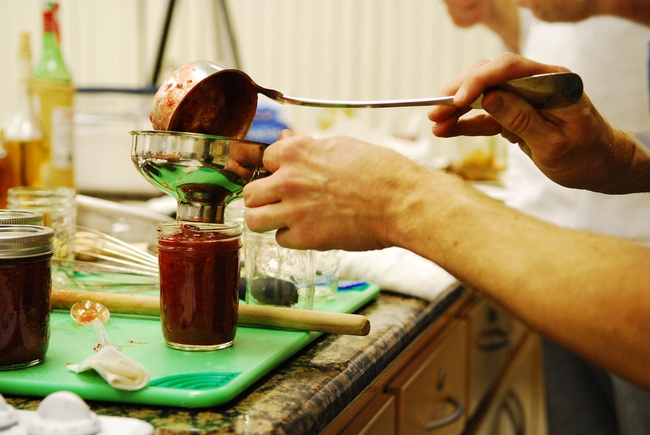
This time of year, many food preservation enthusiasts are hard at work in their kitchens canning, freezing, drying and fermenting. They are scouring their recipe books (USDA approved, of course!) for interesting and delicious ways to take fruits and vegetables at the peak of their freshness and preserve them so they may be enjoyed year-round. For the home food preserver, this hard work will pay off for months to come, and lucky family members and friends will delight in the delicious gifts that are sure to come their way.
When we think of preserved food, however, we often conjure up thoughts of sticky, sweet jams and jellies and salty pickles and sauerkraut. The treats from the kitchen of a home food preserver are tasty, but it's not exactly health food, right? Well, you might be surprised to learn that this is not necessarily the case.
The many benefits of fermentation
Typical fermented foods include yogurt, soy sauce, miso, tempeh, buttermilk, pickles and sauerkraut. Fermented foods have been used for centuries in almost every culture for long- term food storage, to flavor foods and in times of food shortages. These foods offer a wide variety of health benefits due to the process of fermentation, which actually increases nutrients such as folic acid, vitamin B12, nicotinic acid, riboflavin, and thiamine. Fermented foods also have "friendly bacteria" or probiotics, that are similar to the beneficial microorganisms found in our gut. More research is needed in this area, but some studies show promising results in treating bowel diseases and stimulating the immune system with probiotics. Additionally, the process of fermentation partially brakes down lactose, making it easier for lactose-intolerant people to consume milk-based products such as yogurt.
Cancer-fighting phytochemicals
When food is cooked, dried, frozen and reheated, there is always a loss of nutrients.
Vitamins A, C and B are often degraded through the cooking process, however, some cooked vegetables actually supply more cancer-fighting antioxidants than their raw forms.
For instance, researchers at Cornell University found that heat from cooking actually increases lycopene content and overall antioxidant activity in tomatoes. Lycopene is a naturally occurring chemical (or "phytochemical") found in tomatoes that decreases risk of cancer and heart disease. So what does this mean, exactly? Is it better to eat our veggies raw or cooked? Well, raw tomatoes are undoubtedly a great source of Vitamin C, but it's also a good idea to eat some canned or cooked tomatoes to benefit from the high levels of lycopene and antioxidant activity. This is true for many other vegetables in our diet, as well.
What about all that sugar and salt?
Sure, jams and jellies are often made with a good amount of sugar, and we need to use salt to ferment pickles and sauerkraut, but there are ways to preserve food without high amounts of salt or sugar.
We can't remove the sodium from fermented pickles or sauerkraut (unless we rinse them before eating), but sodium can be removed from fresh-pack pickles. You can find delicious, low-sodium recipes on the National Center for Home Food Preservation website (http://www.uga.edu/nchfp/how/diet_pick.html). One concern we may have about canned vegetables (whether homemade or store bought) is that they are often high in sodium. Well, the salt in canned food is only used to season the food, it is not necessary for safety. So, if you desire to keep sodium levels low, you can omit the salt when canning and use salt substitutes when you're ready to eat the food. Cooking with garlic and fresh or dried herbs is also great way to add flavor to a low-sodium canned food.
There are a variety of fruit spreads that can be made lower in sugar and calories than regular jams and jellies. There are also two types of modified pectin that can be used that require less sugar. Recipes for low-sugar fruit spreads can be found on the National Center for Home Food Preservation website (http://www.uga.edu/nchfp/how/can7_jam_jelly.html).
You can also use gelatin as a thickening agent in low-sugar recipes, but these fruit spreads must be refrigerated and used within a month or so, rather than canned for long-term storage.
Fruits can also be canned more healthfully in water or 100% fruit juices, rather than sugary syrups. These fruits must be ripe but firm and prepared as a hot pack. Refer to the USDA Complete Guide to Home Canning for more information. Splenda is the only sugar substitute that can be added to covering liquids before canning fruits. Other sugar substitutes can be added when serving.
Enjoy the fruits of your labor
The next time you enjoy a jar of home canned vegetables or fermented pickles, think cancer- fighting antioxidants and friendly bacteria for your gut. Not only are you consuming produce that was preserved at the peak of its freshness, but you are certainly doing your body some good!

Tangerines
